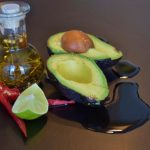By David Blyweiss, M.D., Advanced Natural Wellness
On July 27th you learned all about blueberries, one of my favorite foods.
Another favorite of mine is avocados. And while avocados have never “officially” been part of the Mediterranean diet, I think they fit perfectly with the Mediterranean style of eating. They are rich and creamy with a mild taste. And they have an even more potent nutrient profile than olives.
Like olives, avocados are high in fiber, monounsaturated fats, vitamin A and vitamin E. Both of these fruits also have a high content of two powerful antioxidants, lutein and zeaxanthin.
But when it comes to other certain other vitamins and minerals, the avocado actually outshines the olive. This is good news for you, especially if you like avocados as much as I do.
Now, here’s the thing about avocados. They have a high fat content, so most people thinking eating these fruits will make them fat.
That’s not necessarily true. In fact, the monounsaturated fats (MUFA) found in avocados (and in the Mediterranean way of eating) may help protect against fat – especially abdominal fat accumulation associated diabetes.
You see, it’s the carbohydrate-rich American-style diet that is directly linked to the accumulation of abdominal fat. But just the opposite is true of a MUFA-rich diet. Eating foods high in monounsaturated fats, like avocados, actually prevents the distribution of fat to your belly.
So that’s one point in favor of getting more avocados in your diet. But there’s more…
Here’s What an Avocado a Day can do for You
Eating a single avocado each day can improve your cholesterol profile much better than eating a low-fat diet. It doesn’t just lower LDL cholesterol. It also reduces the actual number of LDL particles along with the number of small dense particles.
Getting those small, dense particles under control is especially important. These are the ones that tend to slip through the lining of your blood vessels where they can do the most damage. They become oxidized. Inflammation sets in. Plaque starts accumulating and blockages begin to develop. So the bigger and fluffier your LDL particles are, the better off your heart will be.
This effect may be why people who eat more avocados seem to have a lower risk of cardiovascular disease. A 30-year study found that people who ate at least two servings of avocado each week had a 16% lower risk of cardiovascular disease and a 21% lower chance of coronary heart disease when compared to those who never or rarely ate avocados.
Avocados are also great for your mental health. When adults 60 years and older took cognitive tests, those who regularly consumed avocado had the highest scores across all of the tests.
This is likely due to the antioxidant and anti-inflammatory effects of the healthy monounsaturated fats, vitamins and minerals in avocado that help reduce oxidative stress and inflammation. MUFAs, in particular, are especially beneficial for brain regions related to memory and visual processing.
And, of course, the cardiovascular improvements that come with avocado intake also have a favorable impact on cognitive health.
Feed Your Eyes
One of the nutrients that feeds your eyes is lutein. And while avocados aren’t the highest source of lutein in your diet, they deliver enough of the nutrient to help reduce your chances of macular degeneration.
Eating an avocado each day can improve lutein levels by 25% in just six months. This, in turn, increases macular pigment density by about the same amount. Macular pigment filters out blue light and protects your eyes from damage caused by oxidation, which helps lower your chances of developing age-related macular degeneration (AMD).
And here’s something very interesting: The large increase in lutein levels is also associated with better cognition! This includes better spatial memory, working memory and problem-solving. So that’s another bonus for your brain.
The impact simple foods like blueberries and avocados can have on your health is absolutely amazing. Stay tuned for the next issue, where I will share another healthy favorite with you.
By the way, I’ve just potted an avocado sapling in my front yard…I’m told it may take two years for my first fruiting…can hardly wait.
SOURCES:
Wang L, Bordi PL, Fleming JA, Hill AM, Kris-Etherton PM. Effect of a moderate fat diet with and without avocados on lipoprotein particle number, size and subclasses in overweight and obese adults: a randomized, controlled trial. J Am Heart Assoc. 2015 Jan 7;4(1):e001355.
Pacheco LS, Li Y, Rimm EB, Manson JE, Sun Q, Rexrode K, Hu FB, Guasch‐Ferré M. Avocado Consumption and Risk of Cardiovascular Disease in US Adults. J. Am. Heart Assoc. 2022;11:e024014.
Cheng FW, Ford NA, Taylor MK. US Older Adults That Consume Avocado or Guacamole Have Better Cognition Than Non-consumers: National Health and Nutrition Examination Survey 2011-2014. Front Nutr. 2021 Oct 14;8:746453. Scott TM, Rasmussen HM, Chen O, Johnson EJ. Avocado Consumption Increases Macular Pigment Density in Older Adults: A Randomized, Controlled Trial. Nutrients. 2017 Aug 23;9(9):919.




